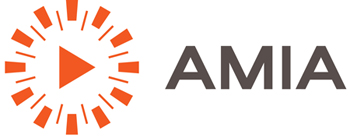Proposal Submissions are Closed
Submissions for proposals for the 2016 Annual Conference are closed.
Preliminary Timeline
- May 16, 2016 – Deadline for Session/Workshop Proposals
- June 15, 2016 – Call for Posters
- Mid July, 2016 – Session Notifications
- August 1, 2016 – Poster Submission Deadline
- August 20, 2016 – Poster Notifications
What Happens Next
Individual Session and Workshop Proposals
All proposals are peer-reviewed. Proposals will be peer reviewed by a panel chosen in a broad range of expertise from the AMIA membership. The Conference Committee uses the ratings from the Peer Review Panel to schedule the conference.
The Committee uses the peer-review notes to program the best balance of sessions and workshops. The categories you check will help the reviewers consider their comments, and will help the Conference Committee in balancing the final program.
After you submit your proposal online you will be sent a receipt letter within a few days indicating that either the proposal is complete or additional information is needed. The Committee will make notifications about proposal acceptance by the end of June, with the first preliminary program due to be released in July.
Program Streams
Streams are accepted based on the stream proposal provided by the curators. The curators are responsible for finalizing the stream sessions and serve as the contact with the Conference Committee on behalf of all stream sessions. The Call for Proposals is only for programming in addition to the streams.
Once the stream is accepted, the curators work to finalize their session abstracts, confirm speakers, etc. As with individual sessions, a conference committee member will work with curators on deadlines and any other logistical details. Because there is a limit on the how many sessions a speaker can participate in, the committee will also work with the curators on final speaker confirmations.
Since all streams are not locked by May, once all of the individual proposals are received, curators will be asked to review the abstracts to make sure there isn’t duplication in the submissions. Sometimes there is a similar proposal to something already planned for a stream and the curator will ask to incorporate it within the stream. At that time the conference committee contacts the proposer and puts them in contact with the curator.
If you have any questions about your proposal, please contact the AMIA Office or the Conference Chairs.
The goal of the Conference is to present an broadly-based program that speaks to the wide range of attendees with a balance of theory and practice, inviting new ideas and concepts that may stimulate additional interest, involvement and educational benefit. In keeping with ongoing membership discussions about diversity and inclusion, we urge proposers to use the conference sessions as an opportunity to include new voices and offer diverse viewpoints.
This year, the conference will include four curated streams of program in addition to proposals received.
- AV Content and Digital Preservation. As 21st century moving image archivists, digital preservation is now a subject that affects us all. This stream focuses on the myriad questions, challenges, and opportunities raised by this subject. Presentations will range from case studies to tutorials, to deep dives into issues like sustainability and access, to spotlighting collaborative initiatives and open source projects. Stream coordinators are Shira Peltzman, UCLA Library; Kathryn Gronsbell, Carnegie Hall Archives. Curation team also includes Ashley Blewer, NYPL; and Rebecca Fraimow, WGBH, and PBCore SubCommittee Chair.
- What’s Next in Moving Image Archival Education. As the profession look towards the future, it is imperative that we reflect on, analyze, and assess how to best equip the next generation with the resources and skillsets necessary. The stream will include examination of pedagogy and instruction, career planning and professional development, case studies involving student-led projects, and most importantly, a critical assessment of the work needed to promote diversity. Stream coordinators are Bryce Roe, Simmons College/AVPreserve and Lily Troia, Simmons College/American Archive of Public Broadcasting. Curation team also includes Rachel E. Beattie, University of Toronto Media Commons Media Archive/AMIA Diversity Committee and Dinah Handel, NDSR CUNY-TV.
- Do It Yourself and Community Archiving. Materials coming from the independent media community, and archivists who support that community often work against major hurdles. Answering those challenges often result in low-cost, do-it-yourself and open source solutions for archiving moving images. This stream investigates these solutions and methodologies for archiving independent, activist and community archives. Stream coordinators are Kelly Haydon, Bay Area Video Coalition;; Robin Margolis, MLIS, UCLA, Oral History Projects Academy Foundation. Curation team also includes Molly Fair. University of Richmond, Justseeds; Marie Lascu, Crowing Rooster Arts; Rachel Mattson, La MaMa Archives; Yvonne Ng, WITNESS; Tom Colley, Video Data Bank; Stephen Parr, Oddball Film+Video; and Dave Rice, CUNY Television.
- Environmental Issues and Archives. The stream will discuss the aspects of climate change, environmental issues, and energy/power issues that impact archives. The goal is to raise awareness and provide support to archivists on methods to advocate within their institutions to effect change. It is imperative to get cultural institutions, including film archives, completely off the grid. Stream coordinator/curator is Caroline Yeager, Advocacy Committee Co-Chair.
